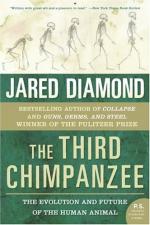
|
| Name: _________________________ | Period: ___________________ |
This test consists of 5 short answer questions, 10 short essay questions, and 1 (of 3) essay topics.
Short Answer Questions
1. What does the author say about the numerous scientific approaches to aging that have been proposed and numerous theories that have been suggested?
2. What does the author conclude about a species' long-term survival probability?
3. What have a few captive gorillas and chimpanzees been taught to do?
4. What happens to all animals?
5. Is the third art criterion uniquely human?
Short Essay Questions
1. What do most scientists think about language? How does this author's view differ from other's views?
2. What is the purpose of this chapter?
3. When do various primates break off from the remaining higher primates?
4. What takes place about 200,000 years ago?
5. By what is the author's biological viewpoint complicated?
6. How are females nearly unique among animals in menopause?
7. What is known about animal vocalizations?
8. What is one of the most instructive avenues of investigation on human sexual attraction?
9. What is the correlation between the sizes of the male and females of species?
10. What have paleopathology investigations demonstrated regarding pre-agricultural hunter-gatherer humans and the average agricultural human?
Essay Topics
Write an essay for ONE of the following topics:
Essay Topic 1
The book considers whether art is a uniquely human endeavor.
Part 1) What criteria does the author use to decide if something is art. Do you agree that these criteria are necessary when deciding whether or not something is art? Why or why not?
Part 2) Based on what the author states about art, can animals be artists? Why or why not?
Part 3) What is your definition of art? Based on your definition of art, can animals be artists? Why or why not?
Essay Topic 2
A theory is presented that seeks to explain human tobacco, alcohol, and drug abuse as a form of deliberate handicap.
Part 1) How does the author try to prove that this abuse is a form of deliberate handicap? What is a deliberate handicap found in other animal species?
Part 2) Do you agree that that drug and substance abuse is a form of deliberate handicap? Why or why not?
Part 3) Do other animal species purposely cause harm to their bodies? Why or why not?
Essay Topic 3
The author recapitulates human evolutionary history from the earliest upright hominids to modern humans.
Part 1) Describe the evolution of man. Why do various changes take place? How do these many changes make humans what they are today?
Part 2) Could this evolutionary history be disputed? Why or why not?
Part 3) Will humans continue to evolve? Why or why not? Is each generation of humans evolving? Why or why not?
|
This section contains 1,316 words (approx. 5 pages at 300 words per page) |

|




